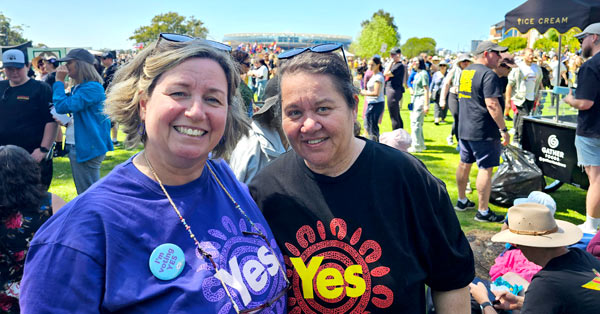
A simple act of empathy, support, and perspective
Australia Day holds varied meanings for Australians. However, for many Aboriginal and Torres Strait Islander peoples, it symbolises colonisation, loss, and intergenerational trauma. At Health Consumers’ Council (HCC), we believe it is vital to acknowledge this history, understand its impact, and support First Nations peoples not just on January 26 but every day.
Standing in solidarity with Aboriginal communities
As advocates for all healthcare consumers in Western Australia, we recognise the importance of listening to, and amplifying, the voices of Aboriginal peoples. For many, January 26 is a day of mourning and reflection, highlighting ongoing challenges such as significant health disparities.
On the Australia day public holiday (27 January) our office will be open
At HCC, choosing to give staff the opportunity to work on the Australia Day public holiday is an act of solidarity. This is something we have done for a couple of years now and it has been welcomed by staff. We believe there is much to celebrate about Australia, but we recognise the colonial history of the current date, and so don’t see it as a day for celebration. Our team members have the option to work on this day and take another day off instead, or to take the day off if that’s their preference.
Encouraging dialogue, empathy, and micro-activism
By sharing our decision to work on Australia Day we hope to spark reflection and conversation within organisations and communities. By reconsidering the significance of January 26, we aim to promote inclusion, equity, and a deeper understanding of its impact on Aboriginal and Torres Strait Islander peoples.
This is one of the steps we take to acknowledge the truth of our nation’s history and to play our part in fostering a more inclusive future.
This reflects our broader commitment to addressing health inequities and standing with Aboriginal communities as they continue their work to address the harm of colonisation that is still experienced by many people today.
We also work throughout the year to address health inequities experienced by other groups and you can find out more about that work on our website.
Acknowledging some key dates in Australia’s history
- 65,000+ years ago: First peoples from Southeast Asia arrived in Australia, forming the world’s oldest continuous civilization.
- 1606: Dutch explorers became the first Europeans to land in Australia.
- 1788: Captain Arthur Phillip raised the British flag at what he named as Sydney Cove on January 26.
- 1818: NSW celebrated January 26 as a public holiday to mark the 30th anniversary of the Sydney Cove landing.
- 1901: The six colonies united to form the Commonwealth of Australia.
- 1938: Aboriginal protests on January 26 highlighted the trauma of colonisation, calling it “A Day of Mourning.”
- 1988: Protests during the Bicentenary included 40,000 people marching for land rights and against dispossession.
- 1994: January 26 was officially declared a public holiday across all states and territories.
Consider joining us for our workshop Acknowledging Country.
Acknowledging Country
An Acknowledgement of Country is an important start to most meetings and professional gatherings and is an opportunity to express your and your organisations respect for Aboriginal people, Country and Culture.
This workshop is designed to help you start to think about what an Acknowledgement of Country means, the difference between and Acknowledgement and a Welcome to Country, when you should be doing an Acknowledgement and how to personalise and make your own Acknowledgement meaningful and respectful.
You will leave the workshop with some tangible tools to develop your Acknowledgement, have the opportunity to ask questions, to develop your own personalised Acknowledgement and some tips for delivering it with confidence and respect.
All profits from these workshops go directly to supporting Aboriginal health consumers in WA in various ways including but not limited to, funding training opportunities for Aboriginal health consumers and occasionally Aboriginal workers, funding Aboriginal consumer payments to ensure Aboriginal perspectives are heard where they may not be. Please contact Tania to discuss this further.
See more workshops we offer below, or register for our next Acknowledging Country workshop now.




